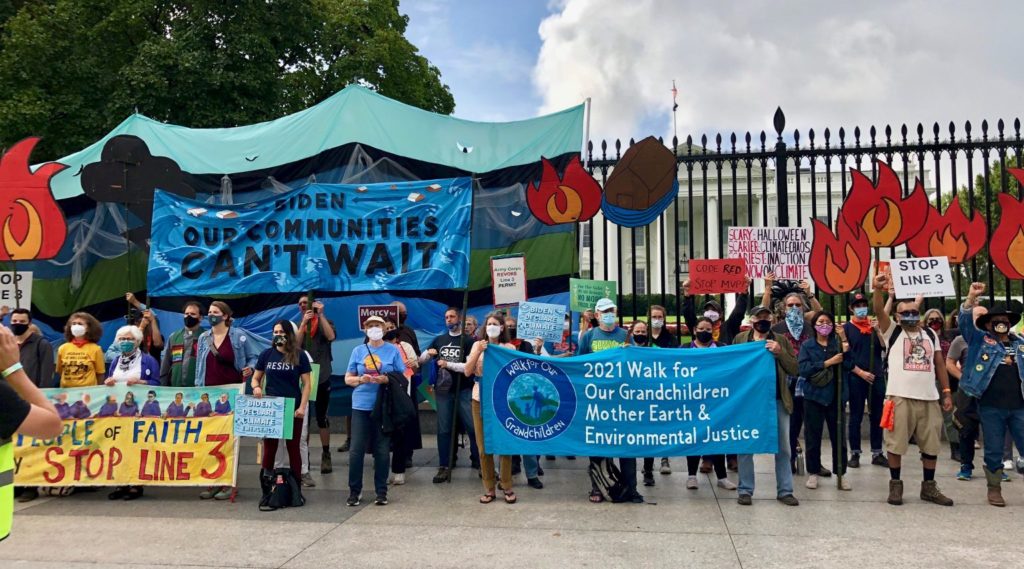Opinion: Love, Justice And Climate Change. An Arrest While Protesting Climate Inaction

This photo was taken by the author during the civil disobedience action. The White House can be seen in the background. Photo: Russ Vernon-Jones

Last Wednesday I was arrested in front of the White House while participating in a “People vs. Fossil Fuels” protest action. We are demanding that President Biden keep promises he made during the presidential campaign and use his executive power to 1) end federal support for fossil fuel projects, 2) declare a national climate emergency, 3) speed the end of the fossil fuel era, and 4) launch a just, renewable energy revolution.
Civil Disobedience
We engaged in non-violent, intentional civil disobedience to underline the urgency and importance of Biden taking climate action–especially in the lead-up to the UN Climate Conference in Glasgow in November. (Our actual offense was that we stood on the sidewalk in front of the White House holding banners and signs and didn’t disperse when the police told us to.) About a hundred of us were arrested, while several hundred more supporters cheered us on from across the street. It was a five-day action with 135 people arrested on Monday, 150 on Tuesday, and more on Thursday and Friday.
This Is A Reasonable Thing To Do
I’m writing about this experience because it was significant to me, but also because I want to normalize it and make it clear that this is a reasonable thing for many of us to do. I do not think we can get the climate action we need in the U.S. until there is a widespread uprising of the people, with hundreds of thousands of us in the streets and thousands of us engaging in non-violent civil disobedience.
The action I was a part of was completely peaceful. Everyone was masked and had shown proof of vaccination. When the police arrested us they led us off two at a time to a nearby tent where they checked our ID against their computer database for outstanding warrants. Some days they issued $50 citations and then released the demonstrators to go pay their fines. The day I was arrested they offered us the option of simply leaving. My friends and I took this option and donated the money we would have spent in fines to the Indigenous Environmental Network which helped plan and lead the action.
Important For White People To Step Up
Other times I’ve been arrested in civil disobedience actions I’ve had to spend several hours in jail and appear in court several days later. Sometimes I’ve been handcuffed and sometimes not. Civil disobedience is safer for White people in the U.S. than it is for Global Majority and Indigenous (GMI) people. (See below for an explanation of this terminology.) For this reason, it is important that White people step up and be willing to be the ones arrested.
Following Indigenous And Black leadership
This action was called for and led by Global Majority and Indigenous people, with the majority of those arrested being White allies following their lead. I found it quite meaningful to be following the lead of Indigenous people from the Line 3 fight in Minnesota and from the struggle against environmental destruction in the Arctic, of Black activists from the fight against toxic plastics plants in so-called “Cancer Alley” in Louisiana, and hurricane survivors from the Gulf coast. In the training the night before the action and in the speeches during the action there was a tangible sense of solidarity, of connection to Earth, and of insistent demands for justice.
Some of this can be seen in the words of two new songs, written for the action by Indigenous and Black poets, that we sang together.
I have not come here alone,
I carry my people in my bones.
I have not come here alone.
And if you listen, you can hear them in my soul.
Rising with the mountain tops,
Flowing with the ocean
We are the protectors. Our spirits have awoken
We are the Protectors.
Is Civil Disobedience Effective?
It’s logical to ask whether non-violent civil disobedience is effective. I can’t promise you that it will be, but given that writing letters, lobbying, voting, marching and rallying have not yet made a sufficient difference, I think it makes sense for many of us to try it boldly and persistently. There is certainly historical precedence for its effectiveness in the civil rights and anti-Vietnam war movements.
Civil disobedience will probably need to be bigger and more persistent before it will move our political leaders, but I got a few glimpses of its impact. While eating lunch at the assembly area afterwards, a Black man who was not part of our group asked me what this group was all about. I briefly explained that we were taking action for climate justice. He asked, “So are you just a kumbaya group?” I said that “we do act in a spirit of love for people and the earth and 100 of us got arrested today demonstrating at the White House.” His face lit up and he said “Oh! You all have real credibility then.”
More Responses
A young White receptionist at a local hotel practically jumped up and down with excitement when she heard what we had done and thanked us over and over again. Our local paper back home wrote a story about the arrests of the four of us who had traveled to DC together, and quoted us extensively. That never would have happened if we’d just gone to a march. Since then a surprising number of people have written to thank us for taking action.
I invite you to get into the streets at every available opportunity to stand up for climate and justice and to consider whether participating in non-violent civil disobedience might be a meaningful thing for you. It certainly has been for me
Global Majority and Indigenous People
There are many opinions about the best terms to use for people often referred to as “people of color” or “BIPOC”, or “people targeted by racism.” The peoples of Africa, Asia and the Pacific Islands, South, Central, and Caribbean America, and Indigenous people, are over eighty percent of the global population. Using the term “Global Majority and Indigenous” (GMI) for these people, and those like them living in predominantly White nations, acknowledges their majority status in the world and interrupts how the dominant (United States and European) culture assigns them a minority status.
This term was developed by people who themselves identify as Global Majority and Indigenous People. I’ve encountered it in several places and have decided to use it regularly in my writing and other work.
Russ Vernon-Jones was principal of Fort River School 1990-2008 and is currently a member of the Amherst Community Safety Working Group and of the Steering Committee of Climate Action Now-Western Massachusetts. He blogs regularly on climate justice at www.russvernonjones.org.
_________________
Caption:

1 thought on “Opinion: Love, Justice And Climate Change. An Arrest While Protesting Climate Inaction”